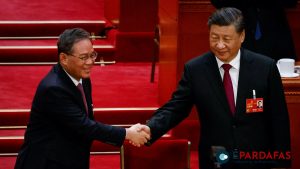
Foreign Direct Investment in China Plummets to 30-Year Low

Amidst escalating tensions and tighter regulations, foreign direct investment (FDI) in China has nosedived to its lowest level in three decades, signaling a significant exodus of foreign corporations from the world’s second-largest economy. Official data released on Sunday by the State Administration of Foreign Exchange revealed a stark reality, with FDI in China plummeting to a mere $33 billion on a net basis in 2023, marking an 80% decline from the previous year.
This precipitous drop underscores mounting apprehensions among foreign investors, driven primarily by heightened crackdowns on espionage and punitive measures imposed by the United States. The figure, which represents new investments surpassing outflows, paints a grim picture for China’s attractiveness as an investment destination, with FDI now standing at less than 10% of its peak recorded in 2021, totaling $344 billion.
The exodus of foreign investment comes on the heels of China’s concerted efforts to bolster its economic prowess through the “reform and opening up” policy initiated by Deng Xiaoping in the late 1970s. However, recent years have witnessed a marked shift in government priorities, with an increased focus on safeguarding national security, prompting a crackdown on espionage and stringent regulations on research firms.
Foreign entities, including Gallup, an American research company, have been compelled to reevaluate their presence in China, with reports emerging of workers from foreign companies being detained. Moreover, revisions to anti-espionage laws, which came into effect in July, have impeded the ability of U.S. and European companies to conduct extensive research before investing, further dampening investor sentiment.
Japanese businesses have echoed similar concerns, with uncertainties surrounding anti-spying laws casting a shadow over investment proposals. The exodus of chip-related businesses from China, in light of U.S. restrictions on semiconductor access, further underscores the shifting dynamics of global investment patterns.
Teradyne, a prominent American manufacturer of chip-testing equipment, has reportedly relocated its production facility from China to Malaysia, while Britain’s Graphcore has downsized its operations in China. The automotive sector has also witnessed seismic shifts, with Mitsubishi Motors announcing the cessation of auto production in China, and industry giants like Toyota and Honda downsizing their Chinese ventures.
Amidst a protracted economic slowdown exacerbated by a slump in the real estate market, China’s economic prospects are further clouded by the departure of foreign investors. While Chinese companies have made strides in technological domains such as electric vehicles and surveillance cameras, the departure of foreign corporations threatens to impede productivity gains and exacerbate labor force constraints, jeopardizing long-term economic growth.
In response to these challenges, the Chinese government has sought to ease regulatory burdens and enhance market accessibility for foreign investors. However, lingering uncertainties regarding national security policies and structural impediments to growth continue to cast a shadow over the efficacy of these measures.
As China grapples with an uncertain economic landscape, the efficacy of government initiatives to attract foreign investment remains uncertain. Whether these efforts will succeed in reinvigorating investor confidence and revitalizing China’s economic prospects remains to be seen.














Comments